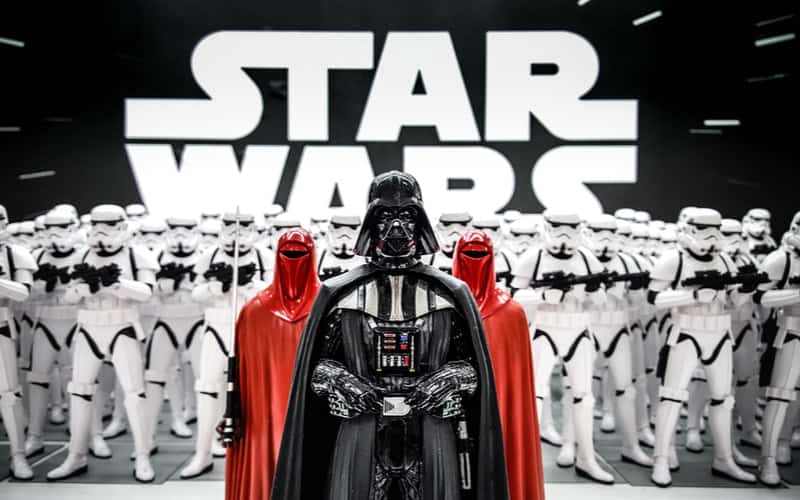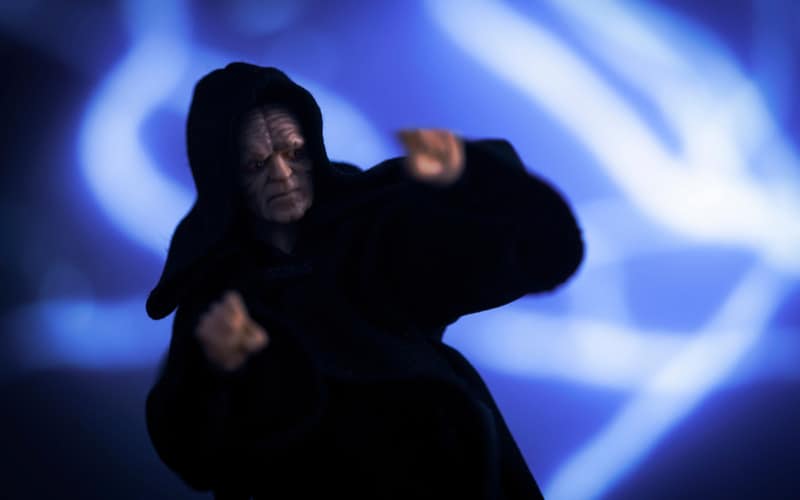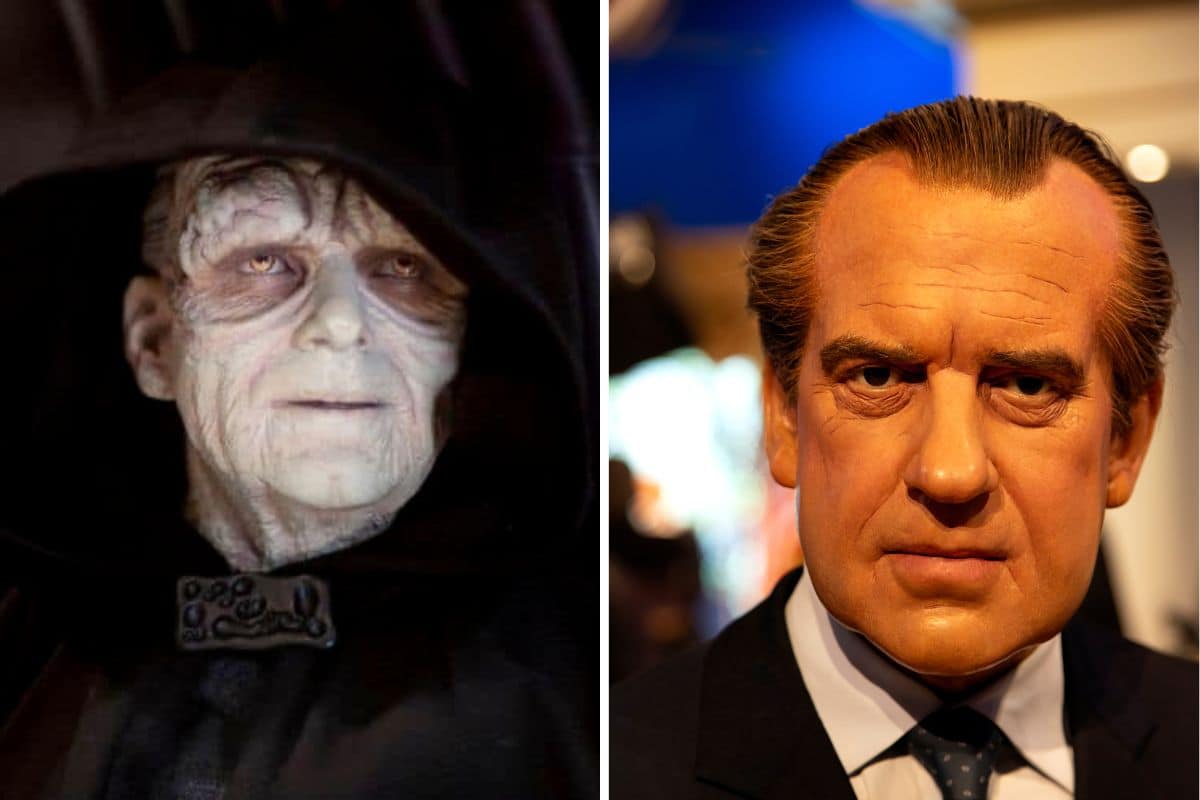Star Wars is one of the most iconic movie franchises out there, but did you know that it is steeped in political themes and messages?
In this article, we’ll take a look at some of those themes, as well as the political inspirations behind many aspects of the popular movie series.
Contents
1. The Empire
The Empire is perhaps the most obviously political component of Star Wars. It is an oppressive, fascist regime ruled by an evil emperor. Freedom is limited and people are arrested or killed simply for being of no use to the Empire.

This evil empire was fashioned after Nazi Germany, as fans noticed from the beginning–from the evil dictator to the soldiers, known as Stormtroopers, carrying out his orders. However, the initial inspiration for the Empire came from elsewhere.
George Lucas first conceived of Star Wars and its Empire during the Vietnam War.
In an interview with the Chicago Tribune, Lucas said, “[Star Wars] was really about the Vietnam War, and that was the period where Nixon was trying to run for a [second] term, which got me to thinking historically about how do democracies get turned into dictatorships?”
Star Wars was Lucas’ answer to his own question. In a subtle way, it served as a warning about allowing oppressive people to rise to power and not caring enough to stop them.
2. Emperor Palpatine
The mastermind behind the Galactic Empire, Emperor Palpatine started out as a senator who pretended to be a good guy. In reality, he invented a conflict that didn’t exist, then played both sides against each other, drawing more power to himself in the process.

If, according to Lucas, the Empire was the United States under Nixon’s presidency, then it’s easy to see that Palpatine’s character was inspired by Nixon himself.
When asked if Palpatine was a Jedi, Lucas responded in 1981: “No, he was a politician. Richard M. Nixon was his name. He subverted the senate and finally took over and became an imperial guy and he was really evil. But he pretended to be a really nice guy.”
Later, Lucas compared Palpatine with Vice President Dick Cheney, saying, “George Bush is Darth Vader. Cheney is the Emperor.”
3. The Republic
The Empire’s predecessor, the Galactic Republic, was political by its very nature. In the Prequel Trilogy, its purpose was clearly to show how a weak government can be corrupted and destroyed by a powerful leader.
The main governing body of the Republic was the Senate, which was full of senators who bickered about everything and couldn’t agree on anything.
This senate didn’t seem to know what to do when Naboo, one of its planets, was invaded by the Trade Federation. Later, it faced civil war and quickly handed supreme power to then-Chancellor Palpatine.
As George Lucas said, “democracies aren’t overthrown; they’re given away.”
The Galactic Republic is a strong example of how weak governments are often taken over from within by a strong leader.
4. The Trade Federation
The Trade Federation was a large corporation controlling trade during the Republic era. Its purpose was to handle disputes involving trade.
Two members of the Trade Federation, Nute Gunray and Lott Dod, seem to have been inspired by real-life politicians Newt Gingrich and Trent Lott.
Beyond that, the Trade Federation provides what one writer has called a “blistering parody” of a capitalist democracy, in that it has representation within the Senate.
The clear message here is that politicians are bought by large, rich corporations that can afford to control them.
5. The Separatists
We already talked about the Republic; the Separatists were the other side of Palpatine’s invented conflict. In some ways, the Separatist movement came about due to the Senate’s poor handling of the Naboo invasion. But it was more than that.
In the Prequel Trilogy and especially The Clone Wars TV show, the Separatists were often shown as individual worlds that didn’t want to be part of the Republic for various, often legitimate reasons–feeling they could rule themselves better, that the Senate wasn’t strong enough or was too political, etc.
6. The Jedi
During the Original Trilogy, the Jedi appeared more religious than political. The Force was some hard-to-define power that gave people superhuman abilities; the fact it wasn’t overly explained made it mysterious, which added to its appeal.
In the prequels, however, we see that the Jedi Order was once its own type of political association.
The Jedi allied with the Republic, but they had their own council, laws, and codes. They were unwilling to bend and change with the times. This caused them to lose sight of more than just their ultimate purpose of protecting all people.
Due to their overly political nature, they alienated the more free-thinking Anakin Skywalker, allowing Palpatine to lead him astray. Finally, he became convinced that the Jedi were the enemy, which completed his transformation to Darth Vader.
7. “So This Is How Liberty Dies…”
In Episode III: Revenge of the Sith, Senator Padme Amidala looks on as Palpatine dissolves the Republic and turns it into the Empire. Her fellow members of the Senate cheer.
“So this is how liberty dies,” Padme says to Bail Organa. “With thunderous applause.”
This brings into focus the point that weak governments are generally corrupted from within by strong leaders–as well as how sinister such plots can be. It also harkens back to Lucas’ own quote that democracies are not overthrown, they are given away.
If you can make people think something bad is good, then you can get away with anything.
8. “If You’re Not With Me…”
Also in Revenge of the Sith, Obi-Wan Kenobi confronts the newly-christened Darth Vader. Vader tells his former master, “If you are not with me, then you are my enemy!”
This comment was very similar to something George Bush had said in relation to the War on Terror: “Either you are with us, or you are with the terrorists.”
9. The First Order
The newer Star Wars content, released since Disney acquired Lucasfilm in 2012, have supposedly been free of the political connections of earlier movies. That said, many political themes are still in place, and fans have taken notice.
A good example of this is found in Episode VII: The Force Awakens. In this film, we see General Hux addressing legions of Stormtroopers, and the scene appears to hearken back to Nazi Germany.
This is the path the original Star Wars movies took, even though their actual inspiration was Richard Nixon’s America. With this in mind, it seems the franchise returned to its roots with the later movies–displaying a dictatorial, militant government in a negative light.
10. Diversity vs. Supremacy
Throughout all the Star Wars movies and shows, this is a major theme. We see the bad guys as being predominantly white men who dress the same and mostly look the same.
Meanwhile, the good guys comprise a ragtag group of men, women, aliens, and droids of all nationalities and backgrounds.
This message is not merely political but cultural, showing it’s better for people of all backgrounds to be able to work together, work out their differences, and respect each other. It is a message that’s as relevant today as it has ever been.

Sarah Hood is a freelance content writer and editor with a love for all things Star Wars. When she’s not writing, she enjoys cooking, singing, and spending time in the great outdoors.
